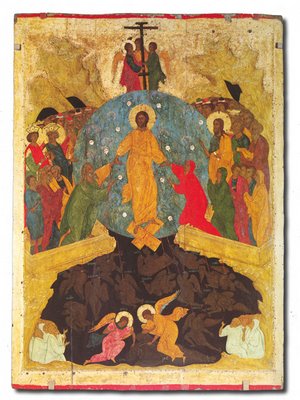 This article of the Apostle’s Creed is certainly by far the most controversial for many Christians, but why? At first, it is hard to believe that the Son of God who is sinless would descend into hell, which we understand it to be a place where there is only pain and suffering.
This article of the Apostle’s Creed is certainly by far the most controversial for many Christians, but why? At first, it is hard to believe that the Son of God who is sinless would descend into hell, which we understand it to be a place where there is only pain and suffering.
As this can be a topic of deep theological discussions, I only attempt here to scratch the surface based on Joseph Ratzinger’s Introduction to Christianity and the Catechism of the Catholic Church.
The “Death of God”
In reality, even though as Christians we believe in the mystery of the resurrection, we may not feel as comfortable in accepting the fact that for the resurrection to be possible, Jesus had to experience death in the same way that all men do. The mystery of our faith is based in the reality that Jesus Christ in fact died; however, this was not an ordinary death. Jesus Christ as the Redeemer, descended into hell in a special way in order to proclaim “the Good News to the spirits imprisoned there.”[1]
Sheol, Hell, and Death
Scholars claim that the word “hell” in this article of the Creed may be a false translation of the word sheol, which meant in the Old Testament a state after death characterized by nothingness. Pope Benedict XVI, in his book Introduction to Christianity, challenges this interpretation of “hell”, which only implies that Jesus died, and inquires further into the meaning of hell and death.
It is in our human nature to be afraid of loneliness. According to the Pope, if we face certain situations, such as being alone in the presence of a corpse, for instance, we will become afraid of the body even though we are aware that we will not get hurt by it. However, if someone else would be in the room with us, our fears would go away, because we would no longer be alone faced with death.
Because we enter into death by ourselves with no one accompanying us, death is also considered as utter loneliness under the Old Testament definition of sheol. This is why the Pope defines death as “absolute loneliness,” but goes further into saying that hell is “death into which love cannot longer reach.” [2]
Christ Conquers Death
Jesus also experienced this loneliness leading up to His death when He cried for the Father: “My God why have you forsaken me?”[3] Subsequently, because prior to the Incarnation, death or the state after death (sheol) was considered as complete loneliness, it is important that Christ’s death would differ from this earlier idea. He descended into hell, our final loneliness, and opened its gates to reach us with His love. When Christ died, death and hell no longer meant the same thing, because from that point on love resided in death.
“Since this love-death of our Lord, death has taken on a quite different meaning; it can become for us an expression of our purest and most living love, assuming that we take it as a conferred opportunity to give ourselves unreservedly into the hands of God” [4]
Scripture and other non Biblical References for Personal Study
Mt 27:52; Mt 12:40; Acts 2:27, 31;Rom 10:7; Eph 4:9; 1 Pet 3:19ff, 4:6
Catechism of the Catholic Church, 632-637
Joseph Ratzinger, Introduction to Christianity
Johann Auer and Joseph Ratzinger, Eschatology: Death and Eternal Life
Hans Urs Von Balthasar, Credo
[1] Catechism of the Catholic Church, 678.
[2] Joseph Ratzinger, Introduction to Christianity (San Francisco, CA: Ignatius Press, 1990), 227
[3] Mk 15:34
[4] Hans Urs Von Balthasar, Credo (San Francisco, CA: Ignatius Press, 2005), 54.












